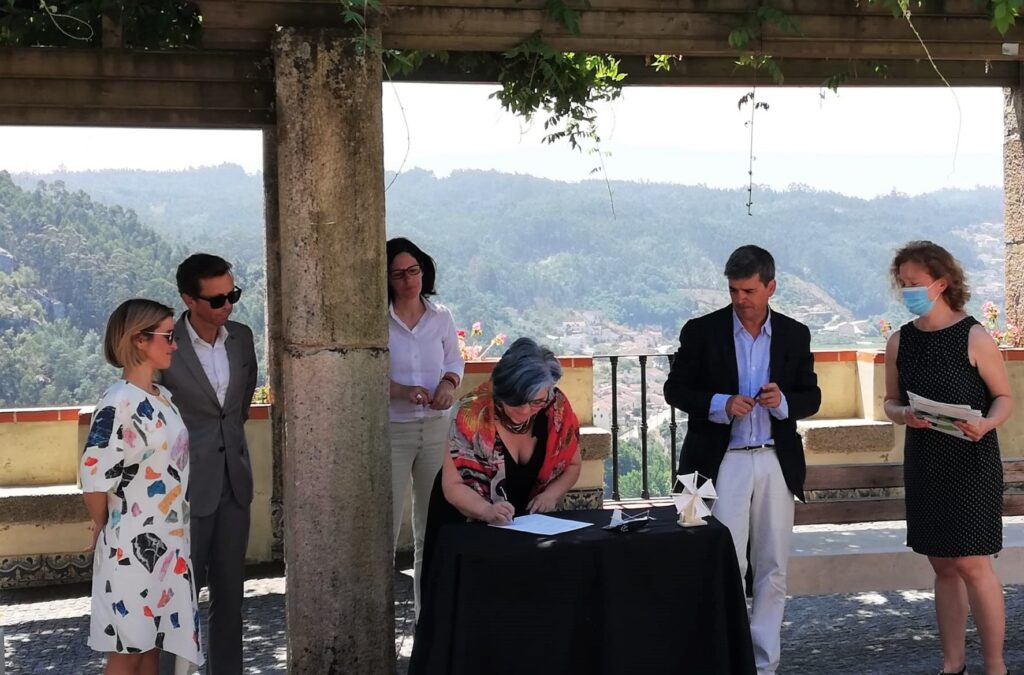The objective is, through the arts, to sensitize populations to change risk behaviors. The project “No Brinques com o Fogo” is launched this Tuesday, 22 June, and the Algarve is also part of it, with São Brás de Alportel being the chosen council.
In Penacova, in Pergola Raul Lino, one of the territories covered by the project, four collaboration protocols were signed today between AGIF - Agency for the Integrated Management of Rural Fires and the Regional Directorates of Culture (DRC) of the North, Centre, Algarve and Alentejo, which foresee that the DRC will become operators of the project for one year.
Adriana Nogueira, regional director of Culture of the Algarve, traveled to Penacova today to sign this protocol.
The objective is, then, to undertake «an innovative approach with the aim of conveying key messages about risk behaviors to change in the face of rural fires, promoting a change in attitudes by raising the awareness of populations about the valorization of the forest and the conservation of nature and good practices in the use of fire for the management of vegetation and territory», explains the Regional Directorate of Culture of the Algarve.
The goal of AGIF, in collaboration with the Regional Directorates of Culture, is to carry out, still in 2020, in the form of a pilot project and for proof of concept, a set of initiatives that, meeting specific cultural and pedagogical objectives and messages- will take place in territories previously defined by the Agency at national level, which have, at some point, had the experience of confronting large fires.
According to Graça Fonseca, Minister of Culture, "this pilot project is part of a more ambitious 10-year strategic vision, which is reflected in the National Plan for Integrated Management and Rural Fires, presented by the Government last Tuesday."
“This is an initiative inscribed in a dynamic of collaboration between Culture and Environment, which values the power of the arts in inviting reflection on aspects such as climate change and environmental protection”, he adds.
Tiago Oliveira, president of AGIF, explains that “this project puts into practice a methodology already tested in countries like Spain, USA and South Africa, with the purpose of reaching local populations through cultural events. If we reduce the number of ignitions, we can reduce the probability of a serious, large fire. We need to change behavior towards the use of fire, whatever the time of year».
AGIF's investment of 185 thousand euros, to be operated by the four DRC, is intended for the production of multidisciplinary outdoor shows and actions to train the population.
Notices for applications for artistic structures from the respective territories are published today on the DRC websites and invite the presentation of proposals, from 23 June to 14 July, by cultural agents for the design and presentation of shows subject to themes such as fires, land clearing, risky behavior, launching rockets or using agricultural machinery in safe conditions.
Private legal persons with headquarters in the municipalities covered by the program may apply, who carry out professional activities of a non-profit nature in the areas of performing arts, namely theatre, music, dance, contemporary circus and street arts and visual arts.
Collaborative applications, which present a multidisciplinary approach and include more than one artistic entity, will be valued. They may also include natural persons and non-professional local cultural agents.
The outdoor shows will be presented in September and October of this year in the councils considered as priorities by AGIF, which are Vila Nova de Poiares, Coimbra, Penacova, Ourém, Paredes, Gondomar, Gavião and São Brás de Alportel.
The counties were chosen according to their classification with a high degree of risk.
Notices of actions, as well as the respective application forms, in the case of the Algarve, can be consulted here



















Comments